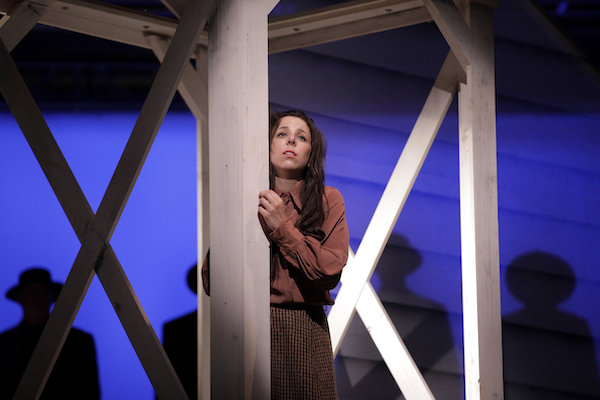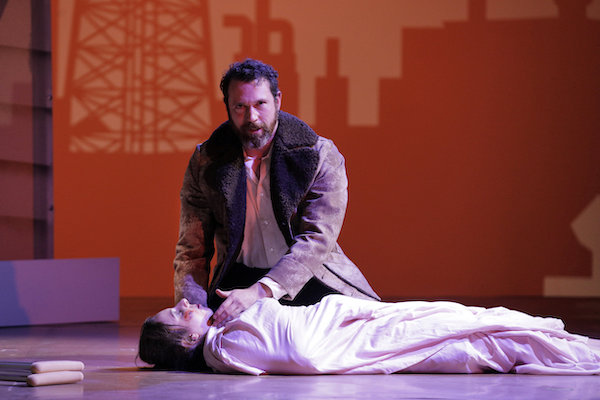This past week West Edge Opera opened its West Coast premier of composer Missy Mazzoli and librettist Royce Vavrek’s opera, Breaking the Waves. The opera premiered at Opera Philadelphia in September 2016.
Based on the 1996 film by Lars von Trier, the opera is set in the Scottish highlands and tells the story of Bess McNeill, a young woman from a closed Calvinist community who marries a Scandinavian oil-rigger, Jan Nyman. When he is paralyzed in a work accident, Nyman encourages Bess to find other lovers. Believing that she can save her husband’s life by doing so, Bess seeks sex from other men, ultimately sacrificing her life.
I was able to talk to the principal singers, Sara LeMesh, who sings Bess, and Robert Wesley Mason, who sings Jan, this past weekend.

LeMesh finds the film “beautiful” and “a complicated and multilayered story that is not often found in opera.” The complexity of the characters and their changes over time were refreshing for the lyric soprano, who saw the opera as depicting their dilemma in “a real and human way.”
She points out that “the composer and librettist utilized the film as a foundation. The von Trier film is very quiet, with handheld cameras that focus on the characters’ expressions, their faces and eyes. Music is used only to punctuate scene changes.” Mazzoli, she added, used this quietness as “an opportunity to add her own female voice to the story.”
The music is “lyrical, tonal, but using chromaticism in unusual ways.” Each character has a motif, which is found in the orchestration. But LeMesh finds the intermingling of voice and orchestration exceptional.
Mason agrees: “The music is incredibly powerful. One moment it’s lyrical and the next moment violent.” He found the treatment of recitatives compelling: “Missy creates an atmosphere around the recitatives. It’s magic.”
The baritone called the opera “a step forward for the art form.” A professional singer from the age of 16, Mason has made a career in American opera working with living composers preparing new work for world premieres. Although he finds Breaking the Waves offers “beautiful vocal lines requiring a high level of technique and strong diction, what makes the opera different is the dramatic scenarios.”
Having a central character who is paralyzed and unable to move for one and a half acts was one of the features of the opera’s dramatic reach. For Mason, not only does it address the question of courage in dealing with disability but the emotions were built into the singer’s physical presence on stage.
Mason did most of the rehearsals in bed, in order to get used to the part. “Singing with a neck brace was a challenge, and we spent some time figuring out the kind of pillows that could make me comfortable.” Director Mark Streshinsky and staff were constantly checking on his comfort. The singer was grateful for the continuous support from the very first rehearsal on: “It’s changed my experience of how to go into rehearsal.”

Mason’s other challenge along with the physical difficulties of combining singing with the portrayal of disability was “to establish the love between Bess and Jan as pure and accepting with no boundaries.” When Jan asks Bess to find other men to love physically the opera runs the risk of seeming to depend on a kind of voyeurism from the character and the audience. Mason wanted to counter that by “clearly establishing the love between them so that we see someone attempting to redefine a connection under their given circumstances.”
LeMesh agrees. She loves singing Bess and Jan’s wedding night: “The singing moves from aria to duet, with unusual metrical and rhythmic changes, and Bess’ singing comes from a place of pure joy.” She also loves the moment at the beginning of Act 3 when she sings with utter conviction about how she feels she can save her husband’s life by loving other men: “It’s very powerful.”
The vocal setting provides its own challenges. Bess’ vocal line is set for lyric soprano, and LeMesh finds this very comfortable for her voice. “It’s very sympathetic to soprano.” But the composition employs several vocal styles. In the story the deeply religious Bess expresses her fears and anxieties in conversation with God. “In the movie, God speaks through Emily Watson, and the actress employs a deep and menacing voice. Missy Mazzoli translates this through sprechstimme” – a cross between speech and singing using lilt and rhythm but without precise pitch. This sits low in LeMesh’s vocal range but is not obscured by the orchestration. “The voice of God,” she adds, “is very oppressive.”
God’s voice is also echoed by the all-male chorus, which takes on multiple roles in the opera as Calvinist community, oil-rig workers and the sexually predatory sailors that ultimately destroy Bess.
Working with the cast, chorus and directors was a pleasure for both singers. “Everyone is very vulnerable at some point in the production,” said LeMesh. It’s great to work with a cast that is trusting and supportive. The orchestra sounds great. Jonathan Khuner is an extremely intelligent and thoughtful conductor.”
What were LeMesh’s closing words? “Go see the show.”
– Jaime Robles
West Edge Opera’s Breaking the Waves continues at Bridge Yard in Oakland through August 18. For information and tickets, visit westedgeopera.org.
